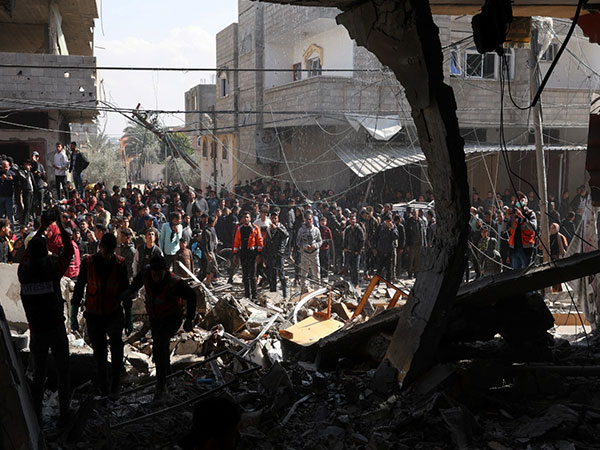Israel and Hamas face pressure for a ceasefire
Jun 05, 2024
Gaza [Palestine], June 5: Reuters said the US delegation to the Security Council introduced the draft resolution to the 15 members of the council. The draft needs at least 9 positive votes and no veto votes from the 5 permanent members of the Security Council, the US, France, UK, China and Russia, to pass.
America wants to borrow the power of the Security Council
The draft resolution calls on Hamas Forces to agree to the agreement and move forward to "quickly complete and unconditionally implement the above provisions." According to Reuters, the draft emphasizes the importance of the parties complying with the terms once agreed, with the aim of bringing about a permanent end to hostilities in Gaza.
In announcing the draft resolution, US Ambassador to the UN Linda Thomas-Greenfield emphasized that many leaders and governments, including in the Middle East, have approved President Biden's three-phase plan. Therefore, the US hopes that the UN Security Council will pass a resolution to promote the signing of the agreement.
G7 leaders also issued a statement fully agreeing with and supporting the ceasefire agreement and the release of hostages in Gaza. Group of foreign ministers of Saudi Arabia and Jordan. The UAE, Qatar and Egypt believe it is necessary to be cautious in taking the agreement in a positive direction.
Hostages are dying
On the same day, The Times of Israel newspaper reported that the Tel Aviv government estimated that more than one-third of the remaining hostages in Gaza died in captivity by Hamas forces. Of the approximately 250 hostages captured by Hamas after October 7, 2023, currently about 120 people are still in the hands of Hamas. Based on many different sources of information, Israeli officials believe that 43 of these people have died. The Israeli side drew the above figure based on intelligence sources, security cameras, video clips and forensic analysis results.
For its part, Hamas said that some hostages died in Israeli airstrikes or died from serious injuries and did not receive timely treatment because Gaza's medical care system was destroyed during the operation. Israeli military. Many medical staff also died in the conflict.
Meanwhile, Oxfam estimates that about 1.7 million Palestinians are crowded inside an area accounting for about 1/5 of the Gaza Strip, after more than 1 million people fled Rafah City, AFP reported. The majority of people who left Rafah are taking refuge in neighboring areas, including al-Mawasi, Deir el-Balah and Khan Younis, with a total area of only 69 square kilometers.
"The above area is designed as a humanitarian zone, but there is nothing humanitarian there," AFP quoted an Oxfam employee in al-Mawasi, adding that the place had no clean water. Meanwhile, Israel's Minister of National Security Itamar Ben-Gvir said that further tightening measures need to be taken if Israel wants to strengthen its position in the Gaza conflict.
"We have not yet taken some measures such as cutting off gas sources, or declaring 'no more humanitarian aid'. Let's do that within 1 or 2 months to see how it goes," Minister Ben- Gvir gave an interview to Israel Army Radio.
According to Oxfam, Israel is making it almost impossible for aid agencies to reach where refugees are taking refuge. Currently, aid organizations face an extremely difficult situation in the process of receiving aid through Karem Abu Salem, the only border gate still open today. The reason was that the process was delayed for a long time due to the Israeli side's delay in signing the documents, as well as the extremely dangerous situation across the border gate in Gaza .
Source: Thanh Nien Newspaper








